Clinic for Roma patients launched by GP practice
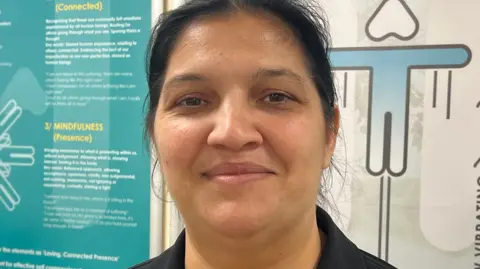 BBC
BBCA drop-in clinic for the Roma Gypsy community has been launched at a GP surgery in a bid to make healthcare more accessible.
Bellbrooke Surgery in Harehills, Leeds, began the trial six months ago with specialist services including a system to translate NHS letters for Roma patients.
Lidia Persidia Holea, from the AME for Roma support group, set up the initiative after she noticed a lack of trust between the community and doctors and nurses, which could lead to poorer health.
"Healthcare is not a luxury - it is a necessity," Ms Holea said.
Ms Holea, who is originally from Romania and has been living in Leeds for 12 years, said she had created the AME for Roma group to help amplify the community's voices.
She said that years of miscommunication had led to a divide between the Roma and healthcare workers, but she had made it her mission to improve the relationship.
The GP practice welcomed her idea for a specialist drop-in clinic, Ms Holea said.
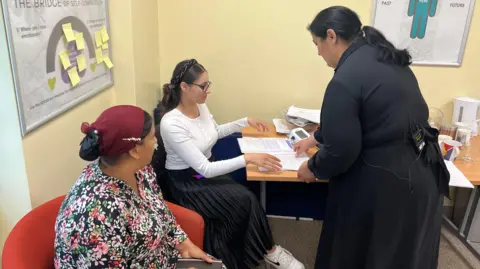
The life expectancy of people from the Roma community is up to 10 years lower than non-Roma people in the UK, according to government data.
They are more likely to feel excluded by the healthcare system due to a lack of cultural understanding and language barriers.
"All their lives, Roma people have been marginalised and not integrated in society," Ms Holea said.
"I listen to people, I listen to their needs and they told me they need a service like this in the GP practice."
As a result, she said she now helped members of her community to get registered with local healthcare providers, book appointments and express their concerns.
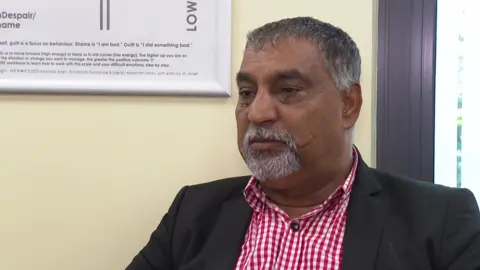
Constantin Mitică, 56, visited the clinic to get help with his diabetes and to book a GP appointment.
He brought a letter with him from the NHS, which he was unable to read himself and hoped to get it translated.
Mr Mitică said he faced a language barrier because he had never had the chance to learn to read or write.
Like many who identify as Roma Gypsy, he missed out on an education in his home country of Romania.
Mr Mitică said the Roma language was not a written language and this had further excluded him, and other members of his community, from integrating into society.
"This makes our lives harder," he said.
"We miss an appointment and don't know how to explain ourselves, or to read the letter and say whether we can accept that appointment or not.
"When we bring a letter to this drop-in clinic, someone can explain what it means.
"This helps us move forward with our health."
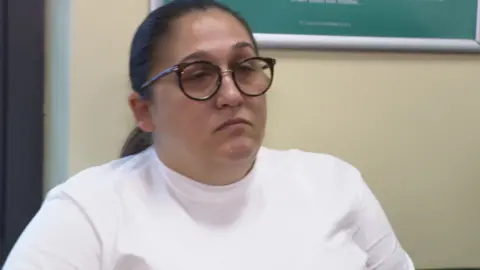
Violeta Călin left her old surgery and registered at Bellbrooke after getting support from the drop-in clinic.
She said she had not always felt "welcomed by the frontline workers" in the past.
Ms Călin said she had previously found it difficult to book healthcare appointments and this had left her "frustrated".
"I was crying and felt my health is not valued," she said.
However, the Roma drop in-clinic helped Ms Călin get a colonoscopy booked and provided her with advice for menopause.
"Just because the group is set up here, we manage to get appointments and engage more with the GP practices," she said.
"We look after our health and understand that it is a priority now.
"I feel like I am being heard and I can also look after my health."
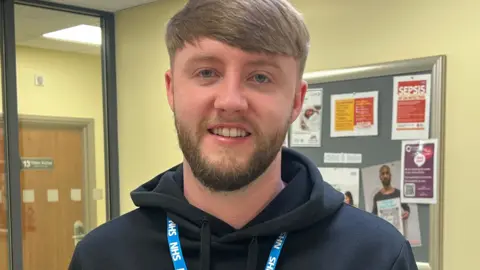
The GP practice had seen an improvement in how well the Roma community engaged with its services since the launch of the trial, a spokesperson said.
Louis Jordan, an analyst at Bellbrooke Surgery, has worked in the Roma drop-in clinic since it began.
He said when the first patients came through the door, many could not speak English.
But he said they were now often able to provide their date of birth and added: "Some are even able to come to me directly with their problems."
"That's where the frustration was - when they are ill they are not able to get across the reasons why," Mr Jordan said.
He said healthcare providers in the area had been trying to improve their services for patients from different backgrounds.
"We had a big meeting with all the surgeries in Harehills, to talk about all the different cultures," Mr Jordan said.
"This has really boosted our understanding."
The trial period for the drop-in clinic is due to end but Ms Holea said she hoped to secure more support for the initiative, which has been funded by the GP practice and Leeds City Council.
"We want to keep going and we need funding for that, we need money to go in," she said.
"We will continue to raise our voices."
Listen to highlights from West Yorkshire on BBC Sounds, catch up with the latest episode of Look North.
